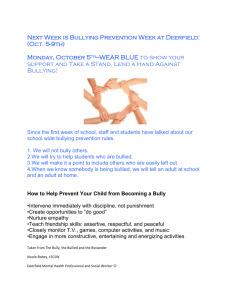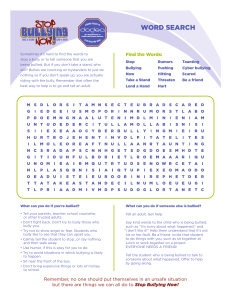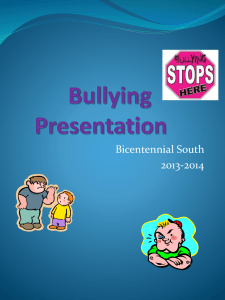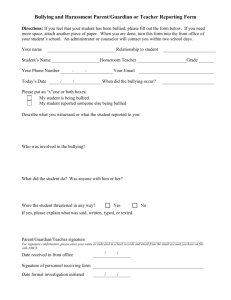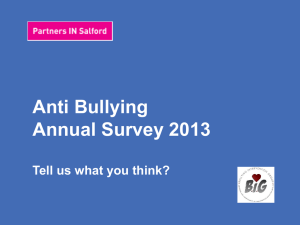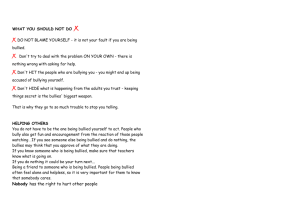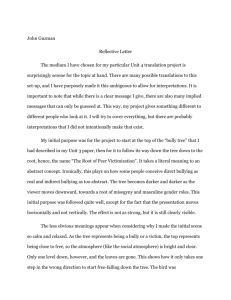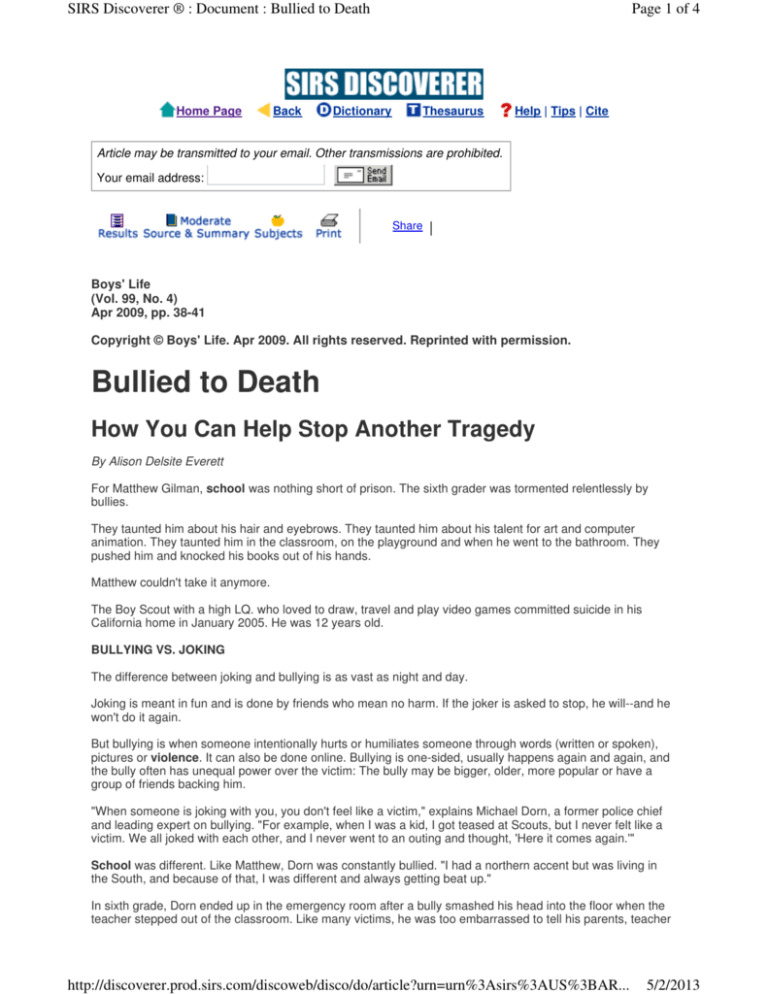
SIRS Discoverer ® : Document : Bullied to Death
Home Page
Back
Page 1 of 4
Dictionary
Thesaurus
Help | Tips | Cite
Article may be transmitted to your email. Other transmissions are prohibited.
Your email address:
Share
Share
Share
Share
| Share
Boys' Life
(Vol. 99, No. 4)
Apr 2009, pp. 38-41
Copyright © Boys' Life. Apr 2009. All rights reserved. Reprinted with permission.
Bullied to Death
How You Can Help Stop Another Tragedy
By Alison Delsite Everett
For Matthew Gilman, school was nothing short of prison. The sixth grader was tormented relentlessly by
bullies.
They taunted him about his hair and eyebrows. They taunted him about his talent for art and computer
animation. They taunted him in the classroom, on the playground and when he went to the bathroom. They
pushed him and knocked his books out of his hands.
Matthew couldn't take it anymore.
The Boy Scout with a high LQ. who loved to draw, travel and play video games committed suicide in his
California home in January 2005. He was 12 years old.
BULLYING VS. JOKING
The difference between joking and bullying is as vast as night and day.
Joking is meant in fun and is done by friends who mean no harm. If the joker is asked to stop, he will--and he
won't do it again.
But bullying is when someone intentionally hurts or humiliates someone through words (written or spoken),
pictures or violence. It can also be done online. Bullying is one-sided, usually happens again and again, and
the bully often has unequal power over the victim: The bully may be bigger, older, more popular or have a
group of friends backing him.
"When someone is joking with you, you don't feel like a victim," explains Michael Dorn, a former police chief
and leading expert on bullying. "For example, when I was a kid, I got teased at Scouts, but I never felt like a
victim. We all joked with each other, and I never went to an outing and thought, 'Here it comes again.'"
School was different. Like Matthew, Dorn was constantly bullied. "I had a northern accent but was living in
the South, and because of that, I was different and always getting beat up."
In sixth grade, Dorn ended up in the emergency room after a bully smashed his head into the floor when the
teacher stepped out of the classroom. Like many victims, he was too embarrassed to tell his parents, teacher
http://discoverer.prod.sirs.com/discoweb/disco/do/article?urn=urn%3Asirs%3AUS%3BAR...
5/2/2013
SIRS Discoverer ® : Document : Bullied to Death
Page 2 of 4
or doctors what had happened.
Neither did the other kids in the classroom because they, too, were afraid of the bully.
WHY DO BULLIES BULLY?
There are many reasons bullies act the way they do.
Some of them do it because they don't want to be bullied themselves. They think that if they are the
aggressor, others will be less likely to hurt them.
Some do it because they think it will help them get in with the "cool" crowd. Others do it because they think it
will make them feel smarter, stronger or better than the person they are bullying.
"And some kids do it because of pain at home," Dorn says. If a bully comes from a home where the adults are
angry, screaming or hurting each other, he or she may lash out at school, or may even think that's how
people are supposed to act.
THE IMPACT OF BULLYING
Dorn knows firsthand the impact of bullying.
"For many years, I had zero self-esteem. I thought I was worthless, hopeless and useless," he says. 'There
were many days I didn't want to go to school and sometimes, I didn't go."
And he's not alone.
Research shows that as many as one in four students have been bullied; those with disabilities are eight
times more likely to be bullied. Bullying impacts both the bully and his victims. Kids who bully are more likely
than other kids to skip or drop out of school, smoke, drink alcohol, get into fights and end up in the juvenile
justice system.
Students who have been bullied are more likely to skip school, have lower self-esteem, be depressed and
lonely, have health problems and think about suicide.
Occasionally, they fight back with violence.
After a series of school shootings, the U.S. Secret Service and the U.S. Department of Education worked
together on an in-depth report on students who committed the violence. The kids studied were different ages
and came from different ethnic, racial and family backgrounds. Some were excellent students; others earned
poor grades. Some had lots of friends; others were loners.
But one similarity for about half of the students was that they had been bullied.
SO WHAT DO YOU DO?
First--violence is not the answer. It will only make the situation worse, rnysicaiiy assaulting someone is never
wise, and it's a crime.
Whether you're being bullied or you witness bullying, the most important thing you can do is tell a trusted
adult. It could be a parent, aunt or uncle, Scout leader, pastor, teacher or school guidance counselor. Make
sure that adult understands this is a pattern of behavior, not a single incident. Ask for help.
If nothing is done about it, "report it to someone else," says Dr. Marlene Snyder of the Olweus Bullying
Prevention Program. "Most adults really care about bullying and will do everything they can to help."
If you're the one being bullied, strengthen your circle of friends and try not to be alone. Staying calm might
work. Bullies are looking for a reaction, and if you don't give them one, they might leave you alone. Also,
using humor is sometimes a way to disarm a bully.
If you see someone being bullied, don't join in. Reach out in friendship to the victim; invite him to sit with you
at lunch or join your activities.
http://discoverer.prod.sirs.com/discoweb/disco/do/article?urn=urn%3Asirs%3AUS%3BAR...
5/2/2013
SIRS Discoverer ® : Document : Bullied to Death
Page 3 of 4
And then if you feel safe, talk with the bully about his behavior. Let him know it's not cool or fair. That may be
enough for him to get the message and stop.
And, Dorn says, believe in yourself. Doing so could save a life. Maybe your own.
"I barely made it out of high school, but I went on to become a police chief," he says. 'Think about your future
and what you can become."
CYBERBULLYING
Ever been humiliated, insulted or threatened online? If so, you've been cyberbullied--something that's
happened to nearly one in three teens, according to a recent poll.
The most common place was in a chat room or through an instant message, but teens also reported
cyberbullying through e-mail and social networking sites such as MySpace, Friendster or Facebook.
And maybe you have cyberbullied someone without even knowing it. Have you ever forwarded a private email without someone's permission or posted it for others to see to embarrass that person? Ever posted a
not-so-nice picture of someone without their permission or spread a rumor by e-mail, IM or texting?
Indiana Attorney General Steve Carter offers these tips about cyberbullying:
* Tell a trusted adult and keep telling until the adult takes action.
* Don't open or read messages by cyberbullies.
* Tell your school if it is school related. Most schools have a bullying solution in place.
* Don't erase the messages--they may be needed to take action. (In fact, you might want to take a Screenshot
of it. Learn how to do this at www.boyslife.org/links/printscreenshot.)
* Protect yourself--never agree to meet with the bully or anyone you meet online.
* If you are bullied through chat or IM, the bully can often be blocked.
* If you are threatened with harm, inform your parents and the police.
For more cyberbullying resources, go to www.boyslife.org/links/cyberbullying.
Visit www.boyslife.org/links/stopbullyingnow for more info. Watch the cool Webisodes to get ideas for dealing
with bullying situations. Read more about it in "Jay McGraw's Life Strategies for Dealing With Bullies" by Jay
McGraw (Simon & Schuster, $17.99) and "Bullies Are a Pain in the Brain" by Trevor Romain (Free Spirit
Publishing, $8.95 softcover).
ARE YOU A BULLY?
* You tease people relentlessly in a mean way, call them names or make fun of how they look, talk, dress or
act.
* You have spread a nasty rumor about someone in conversation, in a note, through e-mail or instant
messaging or on a Web site.
* You have physically pushed someone around just because you felt like it or you wanted to make them look
foolish.
* You've been a part of a group that did any of these things.
So what do you do the next time you're tempted to bully someone? "Put yourself in their shoes, think about
how it will make them feel and what those behaviors will do to your reputation and just don't do it, as there are
always negative consequences," Snyder says. Also, talk to an adult you trust about why you are acting this
way. He or she may be able to help you change your behavior.
Citation :
You can copy and paste this information into your own documents.
http://discoverer.prod.sirs.com/discoweb/disco/do/article?urn=urn%3Asirs%3AUS%3BAR...
5/2/2013
SIRS Discoverer ® : Document : Bullied to Death
Page 4 of 4
Everett, Alison Delsite. "Bullied to Death." Boys' Life (Vol. 99, No. 4). Apr 2009: 38-41. SIRS
Discoverer. Web. 02 May 2013.
Home Page | Current Events | Spotlight of the Month | World Almanac | Encyclopedia
Dictionary | Thesaurus | Help | Tips | Cite | Workbooks | Tutorial | Research Topics
Educator Resources | Privacy | Accessibility | License | Contact
Copyright © 2013 ProQuest LLC. All rights reserved.
http://discoverer.prod.sirs.com/discoweb/disco/do/article?urn=urn%3Asirs%3AUS%3BAR...
5/2/2013

